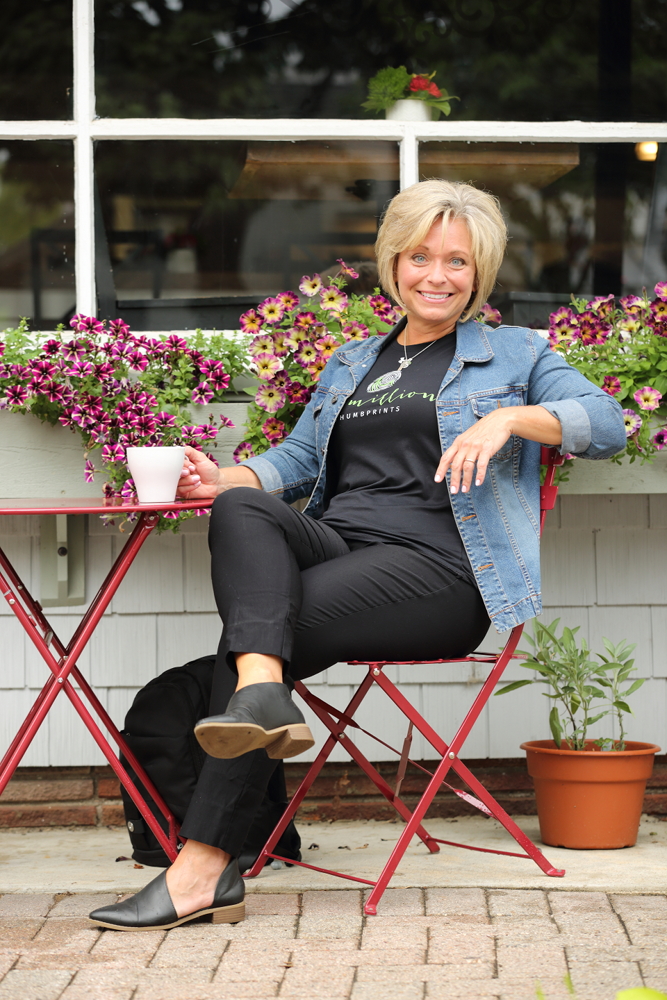One thumbprint by one woman — Esperance, in the Democratic Republic of Congo (DRC) — helped start a movement that has reached from the top of Kilimanjaro to the Beqaa Valley in Lebanon, from dusty African villages to glamorous cocktail parties in the United States.
One Million Thumbprints is the brainchild of Lowell resident Belinda Bauman, a transplant to the area who has written for national magazines and has just had her first book published (see sidebar). One Million Thumbprints started with 10 women and one dream, “to overcome the effect of war on women through storytelling, advocacy and fundraising.”
“A group of 10 women, including myself, were undone back in 2010 by what we were hearing in the news about what was happening in Congo. We were stunned that we weren’t hearing more about the fact that 8 out of 10 women in some regions were experiencing gender-based violence as a result of war,” Bauman said.
“We went from ‘this is terrible’ to getting really mad that women and girls/children were being used as a strategic part of the plan to break a country,” she added.
Warlords and other leaders in conflict zones know that if they can break the women, they can break the family, the community and the country. Rebel militias often are given carte blanche by their leaders to rape, beat and murder women at will. This is what got Bauman so angry.
“To confront this on our own watch in the world where we live is entirely different than reading about it happening in the past. We decided to do something about it,” she said.
The women got busy. In 2012, 7 of the 10 women visited the Democratic Republic of Congo with a group from World Relief, which was actively working on peacebuilding and developmental projects and relief for women in that war-torn country. Bauman’s husband was on staff at World Relief, which allowed them an entrée into seeing how relief projects worked. World Relief workers were listening to women and giving them what they needed — access to medical care, psychosocial care, food for their children, help moving on with life.
The first interview Bauman did — the first story she recorded — was with Esperance. Esperance had watched her husband murdered at the hands of rebels and had been repeatedly and violently raped. She escaped death when her sisters found her in the forest where she’d been taken. A local woman working with World Relief, Mama Odele, helped care for her for three months after that trauma and later helped bring her son, David — the result of the rapes — to birth.
Esperance, who can’t read or write but is now helping other women through trauma recovery, had a message for the American women. She had someone write the words “Tell the world” on a blank piece of paper, then put her thumbprint underneath.
That one thumbprint, from one woman raped in Congo, became the impetus for One Million Thumbprints and the mandate for the nonprofit: “We seek out and ethically tell stories of women in conflict zones so the violence can stop. Violence against one is violence against us all,” Bauman said. “We seek to end violence against women in conflict zones.”
She began collecting thumbprints from women around the world — those who had experienced war-based violence and those who heard their stories and thus became witnesses.
Collecting thumbprints became the outward mark of hearts eager to amplify women’s voices, fund programs to help women and girls physically and emotionally, and advocate for policies that protect women and girls in conflict zones. The campaign got underway in 2014.
To raise awareness even more, Bauman decided summitting Kilimanjaro, the highest point in Africa, was a fine idea. As she said, “to light our hair on fire and get something started. I decided I’d do whatever is needed to tell the world about women in conflict zones, including climbing Kilimanjaro.”
The group of 14 women summitted on the International Day of the Woman in 2016 after ascending via the second hardest route. One of those was Ruth Bell Olsson. She met Bauman in 2014, bonding over their mutual passion for peacebuilding, particularly for women and children. Olsson, who lives in Grand Rapids and is a pastoral associate at Mayflower Congregational Church, helped Bauman get sponsors and plan the trip.
“It was beautiful and hard,” Olsson said. “After Kilimanjaro, Belinda began writing her book, and the rest of us had to process and sit with what we did and what we saw. We combined a physical challenge with a global activist challenge. I will never know that kind of violence, but I know what it is to be super uncomfortable in my skin, and I can push myself into discomfort to start on an empathetic journey to solidarity with these women.”
Now, she said, Bauman is shining a global spotlight on what has been happening for millennia — targeting women in times and areas of conflict.
One Million Thumbprints and Bauman are partnering with organizations already on the front lines in conflict zones, including World Relief’s seeds and tools program in South Sudan and Together For the Family in Syria. Two Syrian sisters work around the refugee camps of Lebanon’s Beqaa Valley. When the sister in Syria hears of a woman or teenage girl who has experienced the violence of war, potentially trafficked for sex or work duty, she coordinates with her sister in Lebanon to bring the family to safety.
“There is a never-ending flow of violence against women in these areas with a few brave souls on the front lines. One Million Thumbprints sends them funding, we provide trauma training and support,” Bauman said.
She recently traveled to the DRC with actor Ben Affleck and others to explore partnerships with people in that country. Affleck is executive director of the Eastern Congo Initiative (easterncongo.org), which supports Congolese organizations working with survivors of rape and sexual violence and working toward reconciliation and peace.
Bauman’s current projects include fundraising and advocating for Syrian refugee women living in the Beqaa Valley, working with Maryland teenager Lorra Dailey toward an all-girl Kilimanjaro climb in 2021 to benefit One Million Thumbprints and launching a podcast called Brave Souls that focuses on lived experiences of empathy. Season 1 will be available in September.
Bauman also is working with Duluth, Minnesota, artist Natalie Salminen Rude, who read Bauman’s book “Brave Souls” and was following One Million Thumbprints online (onemillionthumbprints.org) when she created “Holy Empathy: Tell the World.” The art piece was unveiled in Minneapolis in early June; Bauman currently is looking for a location to place it in ArtPrize 11 next year.
“I know there are a lot of brave souls in Grand Rapids; I would love to see the city rise to bear witness to the violence against women in conflict zones,” Bauman said. “We have the ability and Grand Rapids has the strength to be able to not only write a check but to take on the deeper responsibility of offering a thumbprint to show Grand Rapids, Capitol Hill and even the United Nations that these women can survive and thrive.” GR
The power of empathy
Belinda Bauman’s book, “Brave Souls: Experiencing the Audacious Power of Empathy,” was released in April. Part memoir, part exposition, part challenge, “Brave Souls” digs deep into the power of empathy.
Empathy — what Bauman describes as “leaning into the feelings of others” — is on the decline, according to recent studies. But empathy, said Bauman, is what we need to move past ourselves and into the hearts and minds of others.
She takes readers with her on her journey to discover empathy and urges them to find it in their own lives. When we move into empathy, we can change the world, she believes.
“Brave Souls” is available at Barnes & Noble, Schuler Books and Baker Book House, as well as online.









Facebook Comments